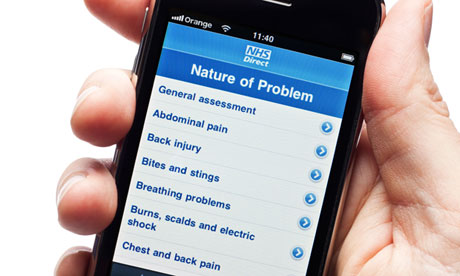
There are more than 1,000 health smartphone/tablet apps released every month. You can use them to measure your mood, track your menstrual cycle (to determine your fertile period) and monitor your glucose levels. Last year the Department of Health suggested that GPs should start prescribing them.
But you shouldn't confuse a health app with your doctor. For a start, they aren't regulated – in the United States, the Food and Drug Administration has been working on guidelines, but in the UK the MHRA only regulates medical devices, which excludes most apps – and are of varying quality.
They can also be harmful. This week a research paper published in the Archives of Dermatology looked at four smartphone apps designed to help people diagnose their skin lesions as benign moles or melanomas. It showed that the accuracy of the apps in identifying lesions that were melanomas varied between 6.8% and 98.1%. The best results were with an app that sent the image of the lesion directly to a board-certified dermatologist for analysis. The worst ones used automatic algorithms to analyse images.
The solution
Smartphone apps can be brilliant but where health is concerned you should be realistic. No app as yet can cure you of a disease. An investigation by the New England Centre for Investigative Reporting found that out of 1,500 health apps, more than one in five claimed to cure or treat medical problems. Nearly half relied on cellphone sound for treatment, others used light and a couple opted for vibrations. The investigation said that scientists were clear that none of these methods could help the conditions they were sold for.
Last year the Federal Trade Commission (FTC) fined the manufacturers of two mobile applications for claiming they could cure acne. The marketers of AcneApp said that a study in the British Journal of Dermatology showed blue and red light treatments (such as were emitted from their app) eliminated p-acne bacteria and reduced skin blemishes from acne by 76%. No wonder more than 11,000 people bought it from the iTunes store. The FTC said the study did not prove the light treatment worked and consumers who were holding their phones to their faces for a few minutes each day were wasting their time and $1.99 (£1.25).
If you do want to use a health app, go for well-known health brands (eg organisations such as the NHS, Red Cross, etc). Apps to track dieting that are produced by established weight loss companies are often good. Otherwise check who the authors are, how often it is updated and if it is referenced.
Meanwhile, doctors may be using apps to support their decision making even more than patients. A 2012 survey of UK doctors found that nearly 20% have a work-related app.

